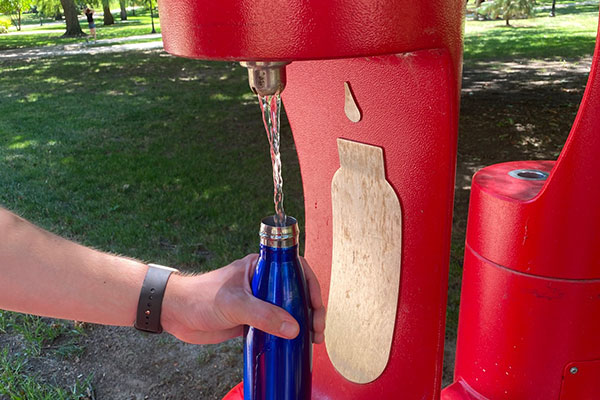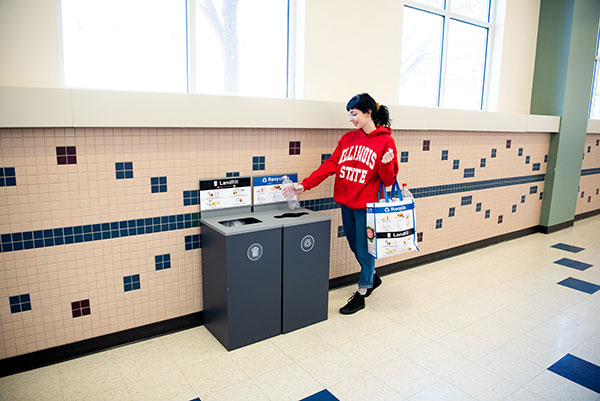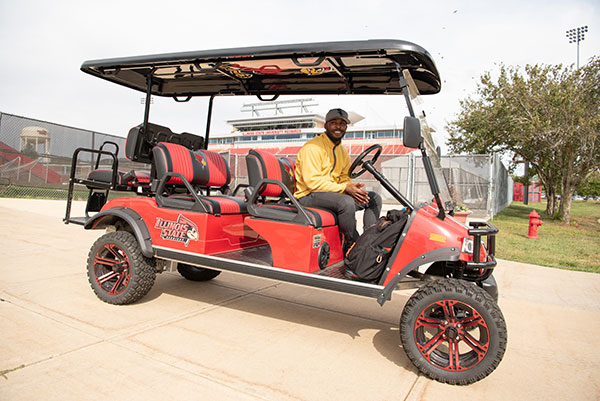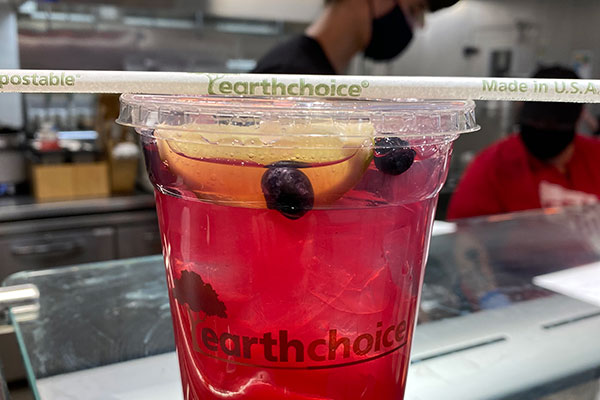
Pursuing Zero Waste
We're reducing our waste by responsibly managing the materials we purchase and consume, and pursuing Zero Waste in all corners of campus.
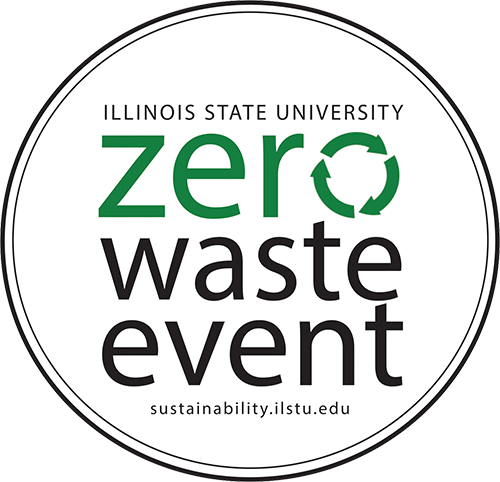
What is Zero Waste?
Zero waste means 90 percent or more of what we consume is recyclable, compostable, or reusable. This helps conserve resources and divert as much waste as possible from landfills.
Zero Waste Efforts
Procurement
When we need to purchase something, we do our best to find responsibly sourced products made from recycled or environmentally friendly materials.
-
Alternatives to Single-use Plastic
We are reducing single-use plastic across campus by transitioning to either resusable or compostable materials wherever possible. We also recommend aluminum products. Compared to plastic, aluminum is infinitely recyclable.
-
Materials
We prioritize purchasing materials on campus made from environmentally friendly and/or recycled materials. This includes composite lumber, carpeting, and upholstery.
-
Foam Free Campus
Illinois State is a foam free campus. We highly discourage the sale, procurement or distribution of packaging foam or expanded polystyrene (EPS) in food containers and packaging materials.
The responsibility for complying rests with the individual departments, faculty, staff, students, and suppliers. Contracted suppliers should not sell, give, or deliver Styrofoam food service product to the campus.
Recycling
We've had an active recycling program since 1989. Today, we recycle as much as we can on campus.
-
Single Stream Recycling
Our single stream recycling program and clear consistent signage across campus lets you place your recyclable products in one spot.
Download our recycling guide to see what you can and cannot place in the single stream recycle bins.
Learn how to request a recycling bin from Facilities Services
-
Specialty Recycling
Just because something can't go in single stream recycling bins doesn't mean it needs to end up in the landfill. The University recycling program can recycle specialty items like electronics, styrofoam, light bulbs, printer cartridges, toner, concrete, furniture, and more.
Contact University Recycling when you have specialty items to recycle.
TechZone will also recycle small and medium sized electronics.
Battery Recycling
Keep batteries out of the landfill. Find recycle bins for your used batteries inside all residence hall lobbies, the Office of Sustainability, Tech Zone, State Farm Hall of Business, the Eckelmann-Taylor Speech and Hearing Clinic, University Athletics, Metcalf School, University High School, and Milner Library.
Visit Environmental Health and Safety to learn more about proper battery recycling, the types of batteries accepted, and important safety policies and precautions.
Composting
Composting turns food scraps into nutrient-rich soil so future food and plants can grow.
-
Dining Centers
We compost our food waste in our two dining centers on campus and at catered events in Bone Student Center. Pulpers chop food scraps and napkins which results in organic compost. Our Dining Centers provide compostable takeout containers and paper straws.
-
Compost Kiosks
Find compost kiosks outside entry ways at Watterson Towers and Linkins, and on Redbird Plaza. Available to all students, faculty, and staff.
-
University Farm
Food scrap from our dining centers can be contaminated with materials that are harmful to animals. This is why we use a commercial compost facility.
The University Farm utilizes their own composting program that contains waste from the farm and Town of Normal Yard waste. You can purchase their compost soil to use in your own garden or backyard.
Reusing
When we share resources and pass on things we no longer need, we extend the life of products and reduce our environmental impact.
-
Programs
There are lots of efforts on campus that promote product reuse.
Pass It On: If you no longer need something when moving out of the residence halls, pass it along to a future Redbird who will put it to good use!
Fix It Friday: The student repair crew will fix and mending your clothing and textile items for free to extend their useful life.
The Share Shop : A free thirft store for students to shop for clothes, accessories, supplies, or small housewares. Campus and community members are invited to donate items for reuse.
The Front Yard Free Cycle: An annual event during Welcome Week to share the items collected at Move Out to incoming students for free.
Reusable Red Tablecloths are available for loan to campus partners for both indoor or outdoor events to replace single-use, non-recyclable plastic tablecloths. Tablecloths are rectangular in length and measure at 60" x 126". They generally fit a 6'-8' folding table. The Office of Sustainability launders all tablecloths after use! Click here to reserve tablecloths for your upcoming event.
-
Dining
We limit single-use products in our dining centers. We mostly use reusable plates, silverware, cups and other products to reduce waste. In fact, our Dining Centers recently eliminated single-use to-go cups, allowing students to bring their own drink container to fill and reuse.
-
Athletics
Athletic contests can create a lot of waste. To help reduce our waste, we implemented a reusable cup program. Redbird fans can purchase one cup and use it for beverage refills at any athletic competition.
-
Electronics
The University's technology department repairs and rebuilds campus electronics as much as possible to expand their life. When the time comes to retire technology, we recycle it responsibly.
There are lots of words associated with sustainability.
Take Part In Zero Waste
Here are small steps you can take to recycle, compost, and reuse.
Recycle
-
Choose to Recycle!
Thanks to single stream recycling, it's easier than ever to keep things out of landfills. It still requires a little effort on your part.
Look for recycling bins all over campus. If there's not one near you, take your waste with you and seek one out.
-
Know how to recycle.
Pay close attention to signage and helpful information that tells you what you can and cannot recycle. Our standardized messaging and centralized waste stations across campus make it easier to sort correctly and avoid contamination.
-
Reduce where you can.
Avoid single-use plastic, especially those that are not recyclable.
Compost
It's easy to get started with composting. Here's how.
-
Save your scraps.
Keep compostable material like food scraps, paper napkins, and BPI compostable containers in a small kitchen compost bin with a carbon filter.
If you don't have a kitchen compost bin, you can use a paper bag and store the bag in your freezer. This prevents odors and pests like fruit flies from entering your living space.
-
Use the kiosks.
Take your scraps to any kiosk around campus for composting.
Reuse
-
Avoid single-use plastic.
Use reusable utensils, containers, straws, etc. whenever possible.
-
Shop secondhand.
Extend the life of clothes and other products by shopping second hand rather than buying new.
-
Repair before you toss.
From clothes to electronics, make an effort to fix something before you throw it out.
Waste Reduction Signs for Print
Print and use these signs when you want to communicate about waste reduction around campus. This helps us use consistent language and imagery, and helps reduce confusion and contamination.
